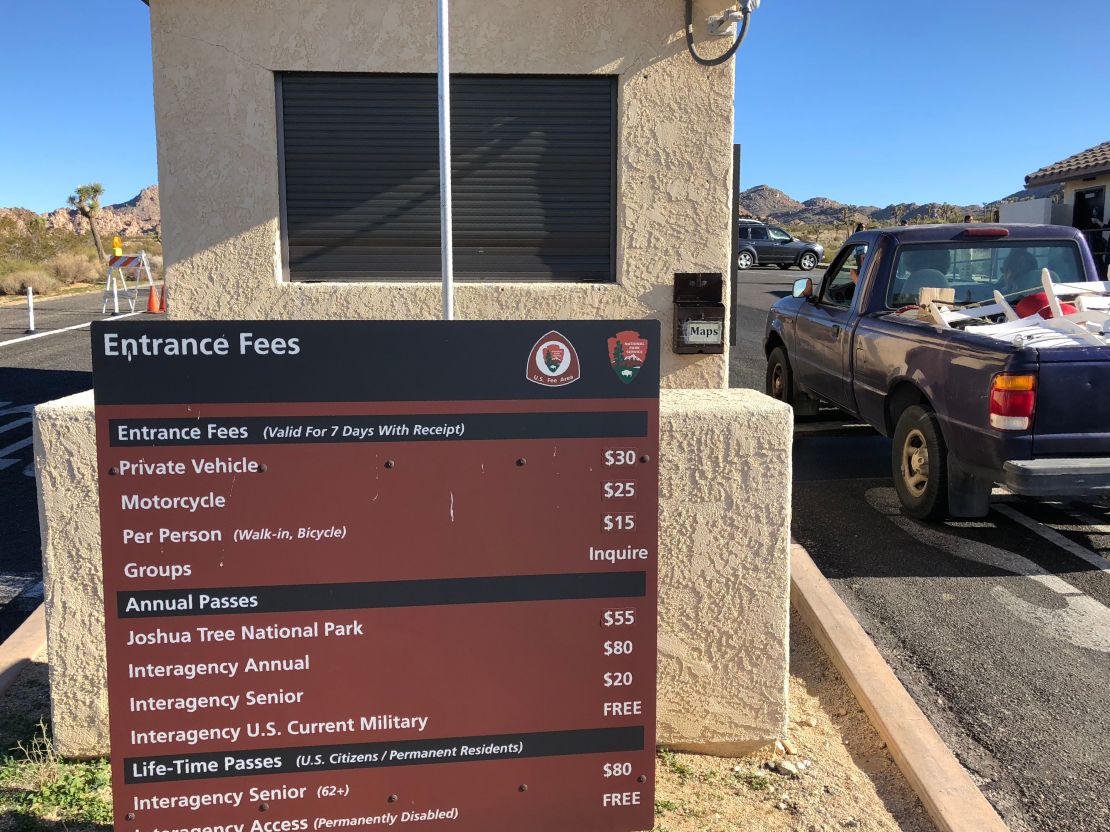California’s Joshua Tree National Park on Wednesday becomes the latest casualty of the federal government’s partial shutdown, with campgrounds closing due to health and safety concerns over near-capacity pit toilets.
With a quarter of the federal government employee workforce beginning 2019 out of work or working without a paycheck, agencies from the National Park Service to the Environmental Protection Agency and the Smithsonian museums are feeling the pinch.
Unlike some previous government shutdowns, in which national parks closed entirely, gates have remained opened under the Trump administration, though parks are severely understaffed.
Joshua Tree, which covers more than 792,000 acres of national park from Palm Springs north to the town of Joshua Tree, will remain open during the shutdown. But its popular campgrounds will close at noon Wednesday, according to the National Park Service.

“The park is being forced to take this action for health and safety concerns as vault toilets reach capacity,” the park service said. “In addition to human waste in public areas, driving off-road and other infractions that damage the resource are becoming a problem.”
Signs at Joshua Tree informed campers this week that the grounds would close “for the safety of visitors and park resources” due to a “lapse in federal appropriations.”
Handwritten signs urged visitors: “Pack out your trash. There are no trash services at this time.”
“It’s impacted (our lives) for fun, but it’s impacted people’s livelihoods and people’s jobs, and it’s disappointing because, you know, is a wall really that important?” visiting Texan Lori Neblett said, referring to President Donald Trump’s unwillingness to back off a demand for $5 billion for his long-promised border wall. The figure remains a nonstarter for Democrats, leaving Congress at an impasse that triggered the partial shutdown.
“I think that we don’t need the wall,” Neblett said. “Maybe a little more border security but not a wall. We could use people coming from Mexico to help, you know, with jobs, and they help fuel the economy as well.”
People can enter ‘at the visitor’s sole risk’
The shutdown has also prevented the park service from making staff available to “provide guidance, assistance, maintenance, or emergency response,” the department said.
“Any entry onto NPS property during this period of federal government shutdown is at the visitor’s sole risk,” the park service said this week.
Trash collection has stopped, along with road and walkway maintenance.
Rattlesnake Canyon will close to reduce the number of potential search-and-rescue events for rangers already spread thin because of the shutdown, the park service said.
The shutdown has also left a stinking mess at Yosemite National Park in the Sierra Nevada mountain range in eastern California.
Yosemite, one of the nation’s most-visited national parks, remains open but various campgrounds, as well as snow play areas, are “closed due to human waste issues and lack of staffing,” according to its website.
On the Yosemite Twitter account, officials said Sunday a “lack of the restrooms and resulting impacts from human waste” forced campgrounds to close.
“People entering closed areas are being cited,” the tweet said.
The visitor center and museum at Yosemite have closed, and emergency response times may increase during the shutdown, officials said.
Communities and wildlife also harmed
The shutdown not only hurts the parks but also surrounding communities that rely on an estimated $18 million a day from tourism, said Kristen Brengel, vice president of government affairs for the National Parks Conservation Association.
“It’s really a big deal for Joshua Tree,” she said of the campground closings. “This is a very popular season for people that come there.”
Staff shortages have created a sense of “lawlessness” in the parks, Brengel said.
“People are bringing in dogs and drones, and there are instances where people aren’t following the rules, and it is not good for the wildlife and the environment,” she said.
Joshua Tree Superintendent David Smith, in a statement, thanked the “local businesses, volunteer groups, and tribal members” who have stepped up to collect trash and maintain grounds during the shutdown.
“This is a reflection on their efforts and the park is very fortunate to have a community that exhibits the kind of care and concern witnessed over the last week,” he said.
But volunteer efforts can’t supplant the work of the park service, said David Lamfrom, director of the California Desert and National Wildlife Programs of the National Parks Conservation Association.
“People are walking off trails, bringing their dogs,” he said. “People are trampling and destroying the things they want to preserve without knowing it. … People are camping where they want or showing up really early or late at certain watering holes so animals like bighorn sheep won’t come down to drink.”
Key parts of the federal government have been impacted since December 22 by the shutdown, including the departments of Homeland Security, Justice, Interior, State and Housing and Urban Development.
CNN’s Nick Watt and Paul Vercammen contributed to this report.

















